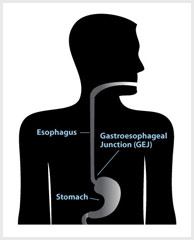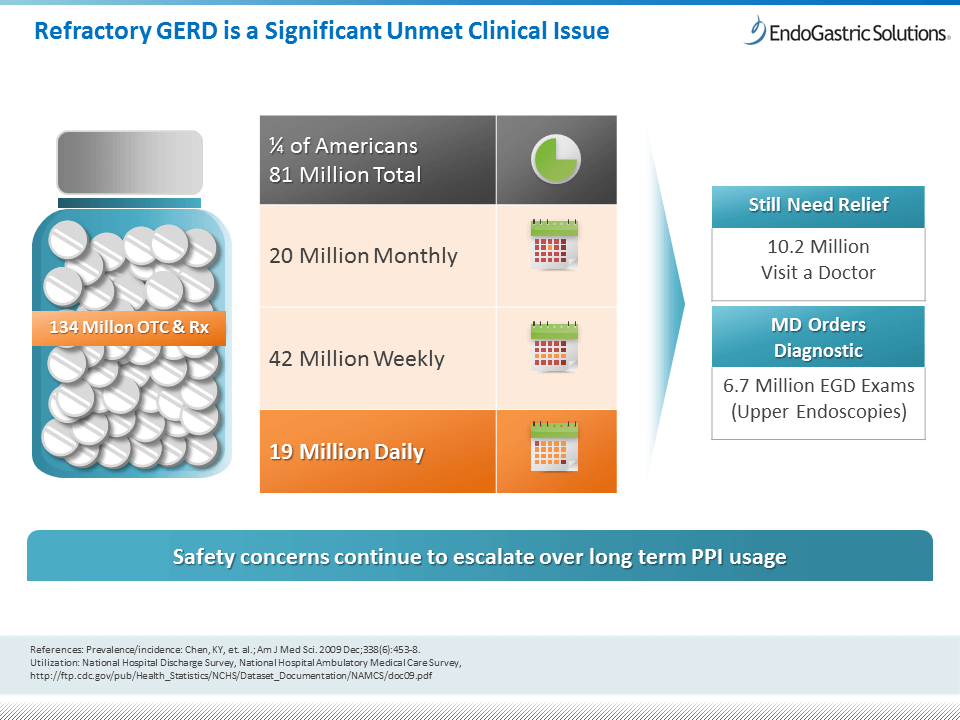Gastroesophageal reflux disease, also abbreviated to GERD, is unusually frequent or chronic reflux. Patients typically experience the symptoms at least two times a week, if not more. In the United States, GERD is one of the most commonly diagnosed gastrointestinal diseases, with nearly 20 percent of the adult population experiencing symptoms regularly. When left untreated, it can lead to serious complications such as changes to esophageal structure or Barrett’s esophagus. Acid reflux has a variety of causes that can lead to GERD. These include, but are not limited to diet, genetics, age and previous injuries.
GERD affects people differently and involves symptoms which vary from mild to moderate or severe. Mild sufferers may experience occasional bouts of heartburn. Patients with more severe reflux can experience heartburn daily. Other patients never experience heartburn but may have symptoms such as asthma, chronic cough, hoarseness, or chest pain due to persistent reflux.
What Is Acid Reflux?
Acid reflux, commonly experienced as heartburn or regurgitation, occurs when stomach fluids back up, or reflux, into the esophagus, exposing it to gastric acid and other contents. While occasional reflux is normal, for some it can be frequent and severe enough to impact daily life.
How GERD Can Impact Your Daily Life
Researchers estimate that pain and discomfort from acid reflux impacts up to 60 percent of the U.S. population every year. GERD can impact a patient’s life in some of the following ways:
- Persistent Typical and Atypical Symptoms: May result in heartburn, chest pain, sore throat and other symptoms despite medication.
- Sleeping Positions: Nighttime reflux can compromise sleep for people who sleep in a typical horizontal position. This can affect alertness and productivity the following day.
- Diet: Dietary restrictions including regimented timing of meals and the need to avoid consuming foods and beverages that trigger reflux.
- Additional Healthcare Costs and Work Productivity: Costs associated with GERD can reach thousands of dollars annually in medications and lost productivity from work.
How Is GERD Treated?
Treatment for GERD varies from person to person depending on the severity of symptoms: mild sufferers may experience relief by implementing simple lifestyle changes, while others can control symptoms through medication therapy. However, common medications like Proton Pump Inhibitors prescribed to control GERD symptoms carry their own risks and limitations, and may not be the best long-term solution for GERD.
People who experience more debilitating symptoms of GERD consistently may require or opt for surgery. It is important to remember that GERD is a chronic disease that usually requires lifetime management to control symptoms if left untreated.
What Happens if You Don’t Treat Gastroesophageal Reflux Disease?
Chronic, prolonged exposure to reflux may result in inflammation, irritation or swelling of the esophagus. This condition, known as esophagitis, can be accompanied by more concerning complications such as ulcers, hemorrhage or precancerous cellular changes.
While symptoms alone can significantly interfere with one’s quality of life, GERD is also associated with the development of Barrett’s esophagus, a condition that causes a cellular change in the lining of the lower esophagus. In a percentage of patients, it can progress to esophageal cancer, a potentially life-threatening illness. To avoid this and additional potential complications, it is important to take GERD symptoms seriously and seek evaluation and diagnosis from a healthcare professional as soon as possible.
Talk to Your Doctor About GERD
Having heartburn or acid reflux from time to time is normal; having it frequently interrupt your life is not. If you suffer symptoms of reflux more than twice a week, you may have GERD. Take the GERD-HRQL (Health Related Quality of Life) survey if you suspect a problem and bring the results to a qualified physician near you for a GERD evaluation.



